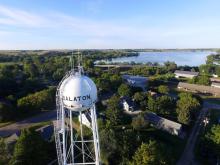Connectivity Purgatory: Frontier Delays Small ISP’s Fast Network
It took an extra year for a community in Minnesota to finally see high-quality Internet service. Balaton spent an extra year in connectivity purgatory while Frontier delayed a much-needed project. To learn more, we connected with the Balaton and Marshall Economic Development Director Tara Onken and Woodstock Communications Vice President and General Manager Terry Nelson.
Balaton: An Underserved Community
Balaton, is a small town of 600 people in Lyon County, located in the southwest area of the state. Balaton’s Internet service is dismal; residents have access to satellite, fixed wireless, or DSL. Satellite is unreliable, and the fixed wireless services’ max speed is 5 - 10 Mbps. DSL service varies based on how far the home is from the central office. In some places in town, DSL should be able to reach broadband speed -- 25 Mbps (download) / 3 Mbps (upload), but in reality, DSL is slow and unreliable because it is based on old copper lines.
In 2016, the small private company Woodstock Communications decided to improve connectivity in Balaton. Woodstock already had service to a few local businesses and other members of the community were asking for service. When the Minnesota Border-to-Border Broadband Program grant applications opened, the company requested a grant of about $413,000.
The goal was to bring Fiber-to-the-Home (FTTH) service of 1 Gigabit-per-second (Gbps), upload and download, to the underserved residents -- 40 times faster than broadband. FTTH is the fastest, most reliable technology available but also most capital-intensive. It’s available to only about 25 percent of the U.S. population.



